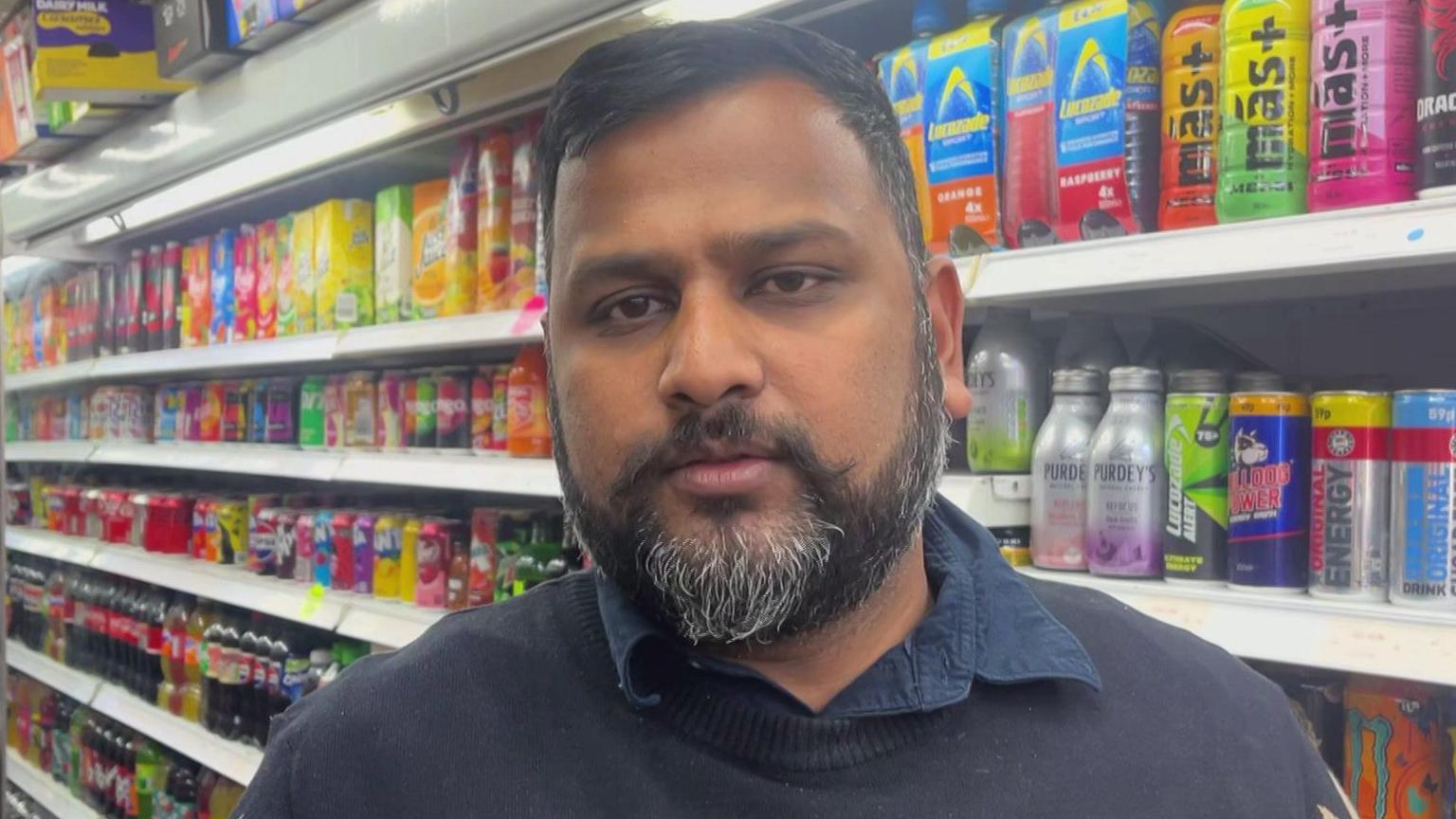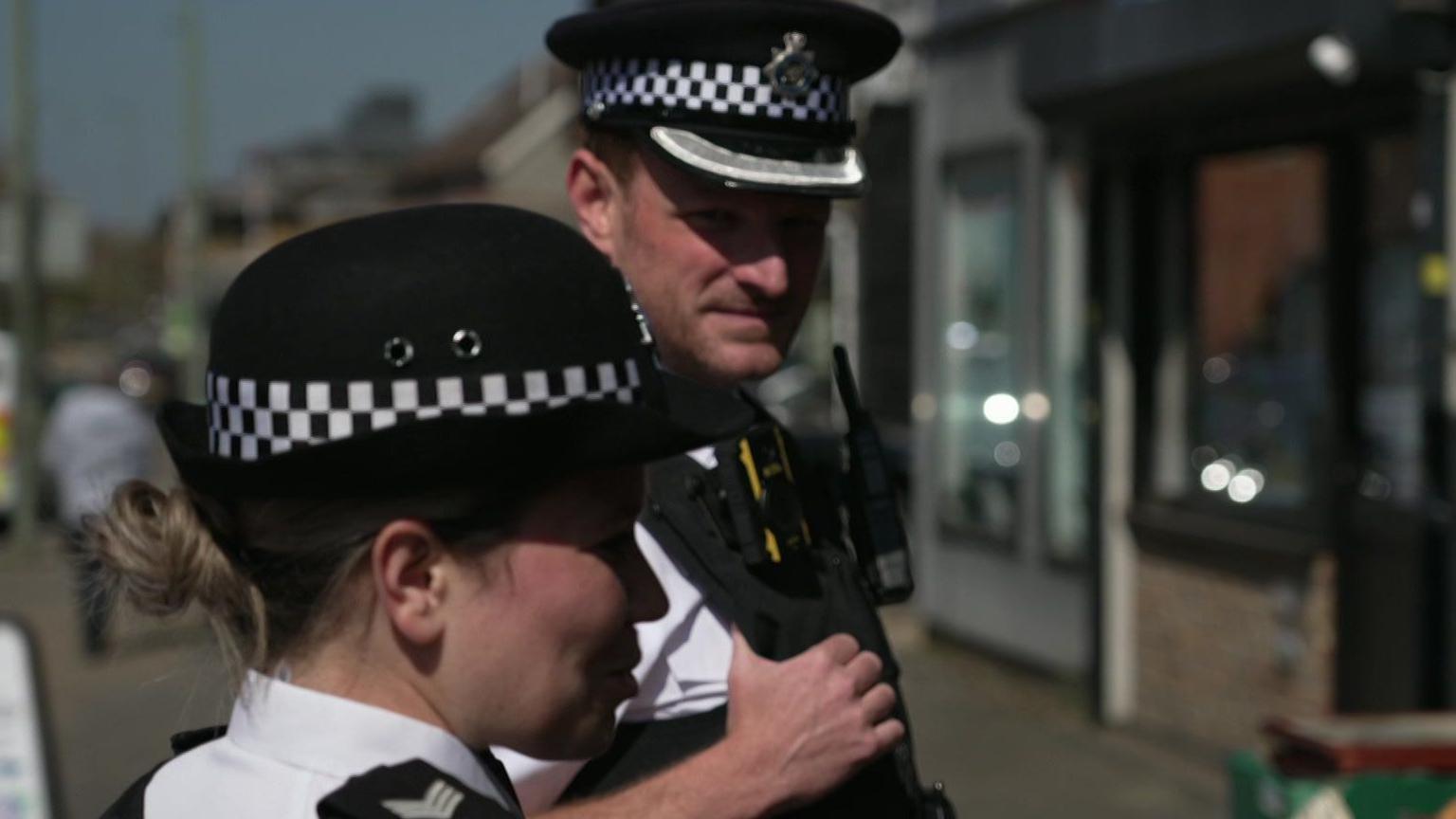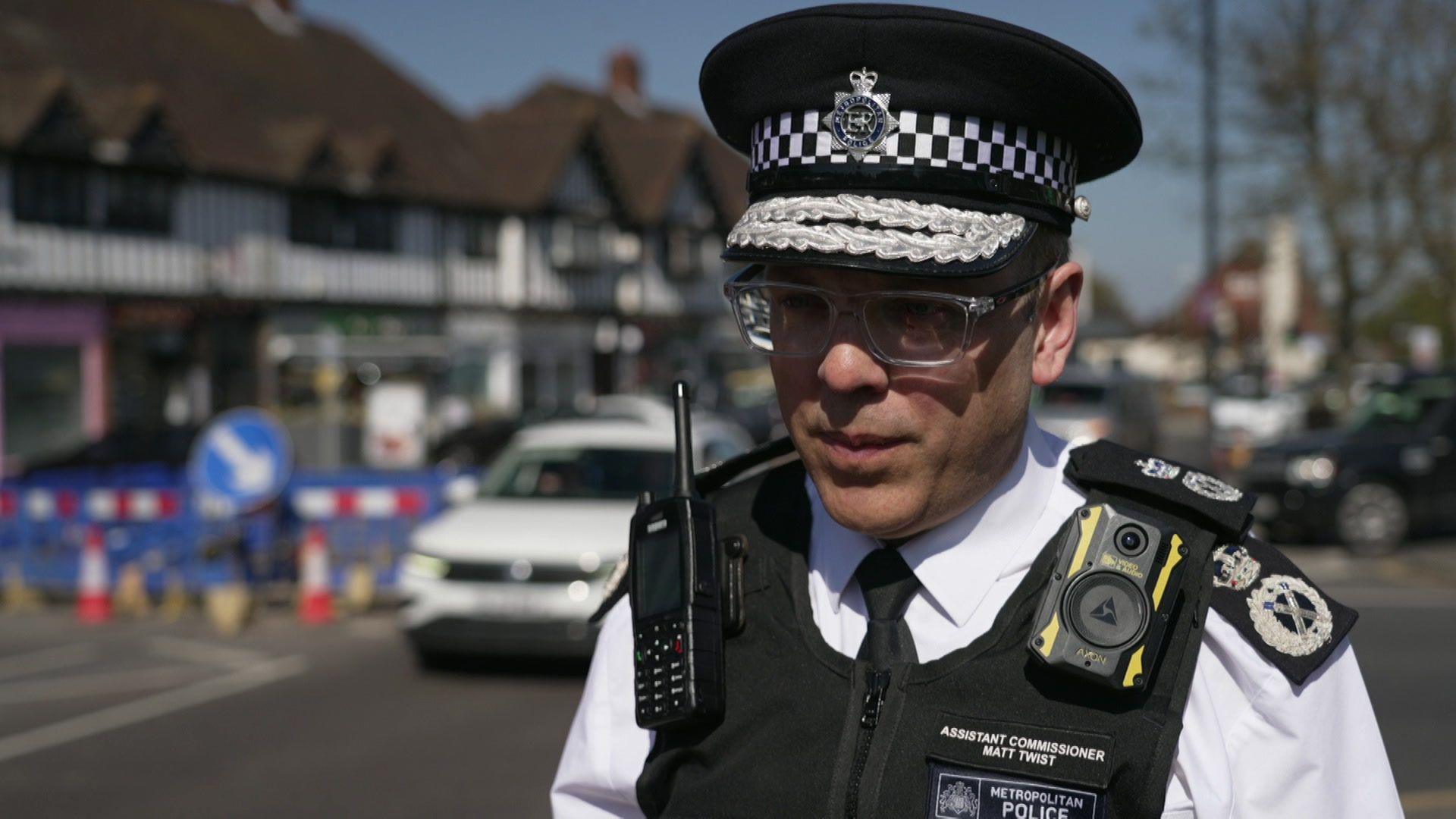'Shoplifting is not a petty crime, the costs add up'

Balu Baskaran says his shop in south-east London is being targeted by shoplifters two or three times each week
- Published
"They just come in, they just take the stuff, and they just walk out, as if it's their shop."
Balu Baskaran shakes his head, as he describes the brazen behaviour of shoplifters who target his small store in Shortlands in south-east London, and how powerless he feels in trying to stop them.
He says one member of his staff was punched in the face when he tried to stop them stealing some vapes and bottles of wine.
Shoplifting in London rose by 54% last year compared with 2023, according to the latest data from the Office for National Statistics (ONS).
Mr Baskaran says that his shop is targeted two or three times a week.
"People think it's a petty crime, but if you add it up, that makes a big impact."
Although the small shop has a cluster of CCTV cameras, he says the police have not taken action, so he's taken to sharing images of the suspects on social media himself, appealing for anyone with information to report them.
"But most people know who they are, and the police don't seem to be doing anything about it."
When shop staff spot suspected shoplifters, he says they lock the doors and barricade themselves inside.
"But last time we did that, they broke the glass on our door, so there's nothing we can do, to be honest."
Just a few miles away from Mr Baskaran, in the same borough of Bromley, police have been piloting a scheme aimed at tackling prolific shoplifters.
Under Operation Kelleher, officers from the Safer Neighbourhood team in Orpington focused on 13 repeat offenders, asking local shops to keep the CCTV from each incident, so suspects could be charged with a number of offences rather than a single theft.
"You can deal with someone for a £50 shoplift, but when you're dealing with them for 20 shopliftings for £1,000, ultimately the courts see it a little bit differently, and that sentencing changes," explains PC Pete Blunden.
He tells me that before Operation Kelleher, local shops were being "cleaned out" and many offences were not being reported.
I put it to him that perhaps some business owners had simply lost confidence that police would do anything about it.
"I do get that. Because a lot of stores, initially their thought process is, 'What's the point? You're not going to support us, nothing's going to happen, nothing's going to change.'"

The neighbourhood policing team in Orpington, south east London say Operation Kelleher has seen a crackdown on prolific shoplifters
PC Blunden says it's been essential to create good relationships and prove police are taking it seriously, while simultaneously getting to know exactly who the prolific offenders are.
"I know them by face and name, and they know me by face and name as well.
"So when I stop and engage with them, even to say hello, it's me telling them, I know they're there, and them saying, 'Pete's around, PC Blunden's around.'"
Figures from the Office for National Statistics (ONS) show that shoplifting rose by 54% across London last year compared with 2023.
Almost 90,000 shoplifting offences were recorded in the capital in 2024, up from roughly 58,000 the previous year.
Shoplifting offences across the rest of England – excluding London – increased by 15% in the last year.
Shoplifters 'out of control' and becoming more brazen, say retailers
- Published30 January
Shoplifting levels 'unacceptable', inquiry finds
- Published5 November 2024
I can't justify my teenage shoplifting, says Stacey Dooley
- Published13 March
Metropolitan Police Assistant Commissioner Matt Twist tells me the key to tackling it is stronger neighbourhood policing, alongside encouraging retailers to report crimes.
He says shops involved in Operation Kelleher have reported an 80% reduction in the amount of stock lost and that arresting prolific shoplifters has had an impact on other local crime too.
"They're not just stealing from shops, they're stealing from cars, they're often stealing from people's homes as well."
The Met has said it is now launching "dedicated Volume Crime Teams across London to tackle offences such as shoplifting".
They added that officers would use the same approach as Operation Kelleher to target the most prolific offenders.

Metropolitan Police Assistant Commissioner Matt Twist says the force is strengthening neighbourhood teams to tackle shoplifting
The government has promised 13,000 new neighbourhood police officers and community support officers across England and Wales by 2029.
However, the Met Commissioner has also warned that the force could lose about 1,700 officers, PCSOs and staff by the end of the year unless the government provides more funding in June's spending review.
"The Met is shrinking, but we are determined to protect our investment in neighbourhood policing," Assistant Commissioner Matt Twist tells me.
Another concern raised by retailers is over whether penalties for shoplifting are tough enough.
Last month, a man who repeatedly targeted a Waterstones shop in Crouch End over a period of almost two years, stealing £3,000 worth of board games, was spared jail.
Paul Mangal, 58, of Haringey, north London, received a 12-month prison sentence, suspended for two years, and was banned from being in possession of a suitcase in two areas of Crouch End and Hornsey.
The Home Office has promised to scrap a £200 threshold that meant "low-value" thefts worth under £200 were subject to less serious punishment, and to introduce a specific offence of assaulting a shop worker.
Matthew Jaffa, from the Federation of Small Businesses (FSB), tells me he welcomes the reforms, but said a wider strategy was needed across the capital.
"We're not talking about the poor single parent that's trying to steal a loaf of bread, this is organised criminals coming in brazenly taking off the shelves huge amounts of stock."
He called on the mayor to introduce an online portal, where businesses could upload details of the offence and where it happened, so authorities could take action.
"One fifth of businesses don't report a crime, and two fifths of those say that's because they don't have the confidence that it will lead to a prosecution. We have to give them that confidence."
A spokesperson for the Mayor of London, Sir Sadiq Khan, said he fully supported the Met Police's approach.
"Sadiq's record £1.16bn policing budget will protect 935 neighbourhood policing roles, empowering the Met to focus on theft hotspots and ensure officers are visible in our communities and tackling local priorities."
Listen to the best of BBC Radio London on Sounds and follow BBC London on Facebook, external, X, external and Instagram, external. Send your story ideas to hello.bbclondon@bbc.co.uk, external